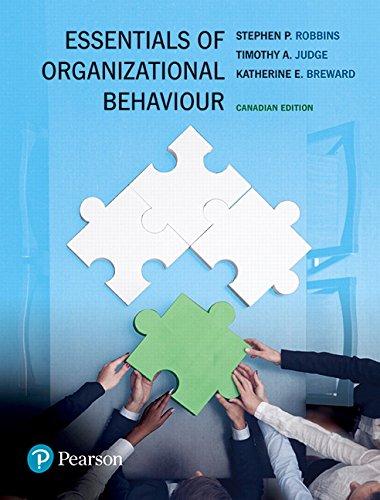As Sophia walked past the cubicles of the production-related office staff, she tried to ignore the occasional
Question:
As Sophia walked past the cubicles of the production-related office staff, she tried to ignore the occasional low, muttered complaint. The resentment over summer hours had simmered this long, a few more days wouldn’t make any difference. As Director of Finance and Information Technology, it was not Sophia’s direct responsibility to manage production staff, but since she was the most senior executive located at their company’s rural packaging plant she felt a certain responsibility to attend to employee morale, even if it was somewhat outside of her formal job description. Now she wondered how to address this mess before it became toxic.
Sophia worked for the Canadian subsidiary of an American consumer packaged goods company who made skin care and personal hygiene products. Their facility in rural Ontario packaged products for the Canadian market, which had unique requirements, such as French and English labelling. The Canadian operations were responsible for their own sales and marketing campaigns. The sales branch focused on placing their products in retail outlets such as grocery stores and pharmacies, while the marketing team focused on reaching end consumers through television and magazine ads. The sales and marketing teams had offices in Toronto, but other functions, such as accounting and information technology, were located in the more affordable rural offices. The rural facility had about 250 employees who worked on the packaging assembly line in two shifts and 35 office employees. Of those 35, six were considered production employees, responsible for taking customer orders, handling customer service inquiries, and ensuring quality control and proper inventory management within the plant.
Ironically, their problems had begun precisely because Sophia was trying to improve employee morale. Several office employees had been asking for summer hours, meaning they would come in half an hour earlier each morning and then get Friday afternoons off. Stephen, the accounting supervisor responsible for a staff of seven bookkeepers and analysts, had been particularly adamant. “Everyone enjoys a long weekend,” he said to Sophia, “and the accounting employees deserve it even more than most because every single month-end they are here until midnight two or three nights in a row while we get the monthly financial statement and reports wrapped up. Offering summer hours is the least we can do.” Sophia had agreed, and had instituted the summer hours for office staff. It was not possible to do the same for production staff, since the packaging assembly line had to keep running through the full two shifts to keep up with demand. That meant that the six production-related office employees also had to stay, just in case they were needed by either customers or the plant staff.
It wasn’t long before one of the most senior production-office employees, an operations expert named Bianca, started to object. It was difficult to watch all her colleagues leaving early to enjoy the Friday sunshine while she and her team were stuck behind their desks just in case they were needed (which they often weren’t). The offices had always had a family feel—most employees had been there over 10 years. Bianca tried not to take it personally, but it was hard. It just didn’t seem fair to her. She had expressed that opinion at a staff meeting last week only to have Stephen in Accounting confront her. “So what exactly is fairness to you anyway?”
Stephen asked. “Because I never see you complain when we are staying late for month end and you are out the door by 5:00 or 5:30!”
Sophia hated to see that kind of infighting developing. She had also noticed that a couple of production employees had called in sick on Fridays recently and some of their reports had been late. That wasn’t a good sign. How could she make everyone feel they were fairly treated?
And what exactly was fairness anyway?
Discussion Questions
1. Using what you know about equity theory, expectancy theory, and organizational justice, explain why Stephen and Bianca have different perceptions of what fairness means when it comes to implementing summer hours.
2. Assume that Sophia makes no changes to the summer hours program. What long-term motivational impacts do you anticipate for office staff? How about production staff? Explain your reasoning.
3. Imagine you are Sophia. What do you do now to maintain the highest possible motivation among the greatest number of employees? Explain your reasoning.
Step by Step Answer:

Essentials Of Organizational Behaviour
ISBN: 9780134182971
1st Canadian Edition
Authors: Stephen P. Robbins, Timothy A. Judge, Katherine Breward





